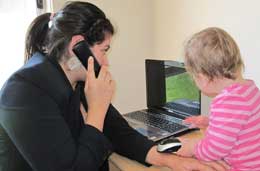24 September 2012
 Women in fulltime employment are hurting – that’s the message arising from the latest Australian Work and Life Index (AWALI) survey which highlights a growing gender divide in work life pressures.
Women in fulltime employment are hurting – that’s the message arising from the latest Australian Work and Life Index (AWALI) survey which highlights a growing gender divide in work life pressures.
The pressure to meet work demands as well as domestic responsibilities, has led to worsening work-life outcomes for women, compared to men, over the past four years, according to survey results which have been published in The Big Squeeze: Work, home and care in 2012 report.
Around 3,000 Australians were surveyed by the University of South Australia’s Centre for Work+ Life for the report, which details that:
- Full-time working women’s dissatisfaction with their work life balance has almost doubled, from 15.9 per cent in 2008 to 27.5 per cent in 2012.
- Experience of chronic time pressure has increased, with 68.8 per cent of full time working women often, or almost always, feeling rushed (up from 63.4 per cent in 2008).
- 41 per cent of mothers in full-time employment would prefer to work part-time – the largest proportion since 2007.
- By comparison full-time men’s levels of work-life interference have remained stable over the past five years.
Continuing gender stereotypes and workplace cultures could help explain the increased pressure women feel in balancing work and life, says co-author of the report, Professor Barbara Pocock.
“Women’s rate of participation in the work place is increasing, yet despite profound social changes, the male breadwinner /female caregiver model of the 20th century is alive and well in 21st century Australia,” Professor Pocock says.
“Many workplace cultures are made in the image of the full-time, male worker unencumbered by care responsibilities. Australian women work around this image and the practices it embeds – while doing around twice as much caring and domestic work as men.
“The Australian policy environment has adapted to working women only around the edges, to provide part-time work, rights for some to request flexibility and paid parental leave, for example, and this research shows that each of these helps. But for many the workplace has not changed to accommodate the different life-time work and care patterns of most women,” she says.
The care responsibilities of women are likely to intensify, particularly in response to meeting the needs of an aging population in Australia.
Increasing men’s involvement in caring and domestic work is an important part of the longer term solution, the report suggests, in reducing the “double day” pressures many women experience through combining their work and care responsibilities.
The report can be downloaded here.
Contact for interview:
Barbara Pocock office 8302 4194 mobile 0414 244 606 email Barbara.Pocock@unisa.edu.au
Media contact:
Will Venn office 8302 0965 email Will.Venn@unisa.edu.au




